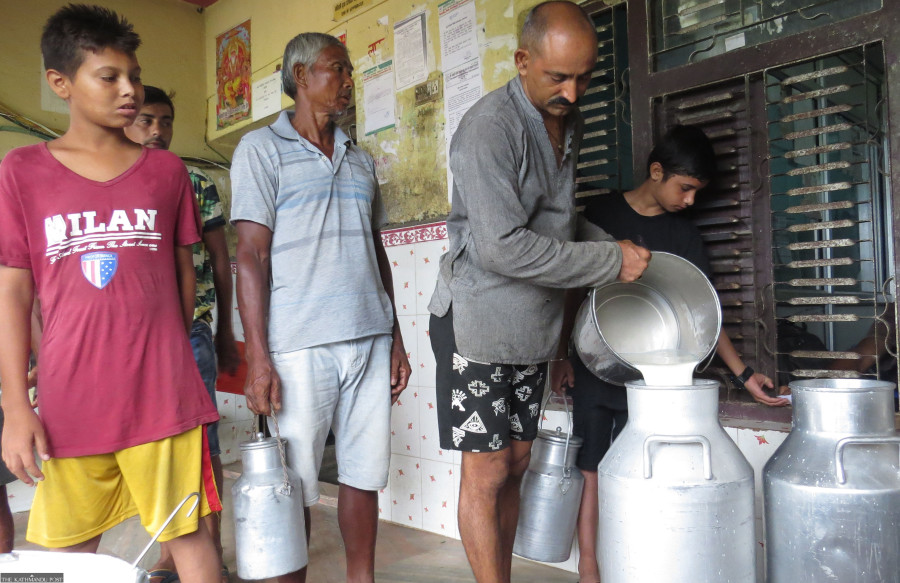Money
Milk worth Rs118 million wasted due to supply disruptions, farmers say
Lockdown forces farmers and cooperatives to dump milk as ghee and milk powder could soon expire for lack of buyers.
Ramesh Kumar Paudel
Disruptions in the supply chain caused by the second wave of the coronavirus have resulted in thousands of tonnes of fresh milk valued at Rs118 million being wasted in just one and a half months, dairy farmers in Chitwan said on Friday.
Schools, restaurants, hotels and universities were ordered closed to prevent the virus from spreading, and this wiped out much of the food service market that makes up a big chunk of the dairy business.
Farmers and cooperatives have been forced to dump milk and even finished milk products such as ghee and milk powder as there are no buyers.
Trucking companies have been scrambling to find drivers to transport dairy products to market as few want to go back to work and risk catching the virus. Sales to major dairies in urban markets have dried up as the food service sector has largely shut down.
“Altogether, 2,090 tonnes of milk have gone wasted since April 29 when Chitwan enforced prohibitory orders,” said Kishore Bagale, secretary of the Chitwan Milk Producers Cooperative Association.
The value of the loss has been calculated on the basis of the minimum price of Rs53 per litre which state-owned Dairy Development Corporation pays to farmers, he said. There are 110 cooperatives associated with the association in Chitwan.
“As per our records, only two cooperatives were fully open during the lockdown period,” he said, adding that dairy cooperatives were open for 15 days on average. “As the cooperatives refused to accept the milk produced by the farmers, we had to write off inventory worth millions.”
The dairy business was hit harder and earlier than other farm sectors because milk is highly perishable as it can’t be frozen, like meat, or stored in warehouses like grain.
Krishna Prasad Sapkota, vice-president of the association, said the government had allowed the dairy industry to stay open, vehicles transporting milk were permitted to pass, and dairy shops were allowed to operate for limited hours, but there simply was no demand. A few cooperatives collected milk from the farmers to make butter and ghee. But that too remained unsold.
Sapkota, who owns Ganganagar Milk Cooperative, said he collected milk from the farmers and produced 9,000 bags of milk powder. Each bag contains 25 kg of milk powder. The expiry date of the product ranges from eight to 18 months.
According to Sapkota, he has stored 15 tonnes of ghee—5 tonnes at a storage facility in Kathmandu and 10 tonnes at the cooperative. “I am worried because it is not easy to sell it.”
The association claimed that private dairies were charging their customers high prices but paying the farmers little while their milk went to waste.
“The price of animal fodder has increased. The price offered by the Dairy Development Corporation is also low, but private dairies were collecting milk from farmers at Rs40 per litre taking advantage of the pandemic,” said Bagale.
“Even the cooperatives were forced to sell their milk cheaply to private dairies.” He said that private dairies had cheated both consumers and farmers. “The government should look into this issue.”
During the first lockdown last year, the Nepal Dairy Association, the apex body of dairy producers in Nepal, estimated that the four-month-long stay-home order resulted in losses totalling Rs20 billion to the dairy industry.
The dairy sector accounts for 9 percent of the agricultural gross domestic product. There are 500,000 farmers engaged in the sector, and it provides jobs to 30,000 people directly, according to the association.
The association said that the country's dairy farmers produce 6.2 million litres of milk daily during normal times. More than 3 million litres used to be shipped to market and the farmers would keep the rest for their own use.




 16.12°C Kathmandu
16.12°C Kathmandu1.jpg)













